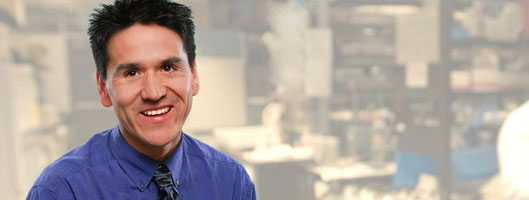Spotlight on Leadership

ALEXANDER RED EAGLE, MD / PhD Candidate
My Inspiration
“Type 2 diabetes is a major problem in Native American communities. People that I know and respect passed away or have lost body functions because of the progression of the disease.”
My Passion
“I took the parts of medicine that I loved and put them together: laboratory research and an interest in the clinical well-being of American Indians. I learned that if you are passionate about something, you will find a way to make it happen.”
My Future
“I didnít want to have to make a choice between clinical practice and research. In the end I plan to do both. I will be able to address an important social issue and still remain in an academic medicine environment where I can conduct research in diseases that affect such a disproportionate number of Native Americans.”
Growing up in north Long Beach, Alexander Red Eagle joined his father at Native American basketball tournaments, Powwows and regular visits to his family reservation in South Dakota. These interactions established a deeply ingrained kinship with his roots and a strong sense of personal identity.
But it was a high school chemistry teacher who helped him decide just how he could make a difference in his community.
“Because of her, I became interested in biochemistry,” says Red Eagle, who earned his undergraduate degree in biochemistry from the University of California, Los Angeles. “I wanted to be involved in research that could have a direct impact on American Indian health care and wellbeing.”
He developed an interest in the biochemical basis of diabetes, a disease that has reached epidemic proportions among Native Americans. As Red Eagle gained experience in the laboratory, he realized he also wanted to keep in contact with the human element of medicine by working with patients directly. As a clinician he could have a direct effect on people’s daily lives; as a scientist he could perhaps discover new insights into disease—and the means to make a long-term impact on Native American health care.
He solved his dilemma by applying to Stanford’s Medical Scientist Training Program and is now a fourth-year student earning an MD/PhD. He plans to do his residency in internal medicine, specializing in endocrinology, and his postdoctoral work in genetics or immunology.
“What drives me is the ability to make a day-to-day impact by interacting with patients directly and the potential of making a long-lasting impact on human health through research,” he says. “I want to use science to give back to my community.”
As an undergraduate, Red Eagle worked alongside several influential professors and sought mentors through professional organizations like the Association of American Indian Physicians and through resources like Stanford’s Center of Excellence. Now he is returning the favor: he organized a conference to expose students from similar backgrounds to new opportunities in medicine and to meet others facing similar challenges and serves as president of the national Association of Native American Medical Students.
“My parents brought me up to realize that education is critically important and that you should take any opportunity to better yourself,” says Red Eagle. “But it’s difficult when you don’t know what steps to take or what the possibilities are.
